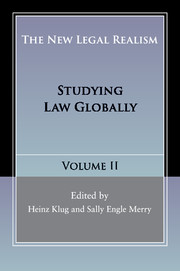Book contents
- Frontmatter
- Dedication
- Contents
- List of contributors
- Preface to The New Legal Realism, Volumes I and II
- 1 Introduction
- Section I The Globalization of Law
- Section II The Global Transfer of Norms
- Section III global institutions and the changing roles of judges and lawyers
- 8 New Legal Realism and International Law
- 9 The Deconstruction of Offshore
- 10 The Changing Roles of Lawyers in China: State Bureaucrats, Market Brokers, and Political Activists
- Section IV Global Justice
- Index
- References
9 - The Deconstruction of Offshore
from Section III - global institutions and the changing roles of judges and lawyers
Published online by Cambridge University Press: 05 May 2016
- Frontmatter
- Dedication
- Contents
- List of contributors
- Preface to The New Legal Realism, Volumes I and II
- 1 Introduction
- Section I The Globalization of Law
- Section II The Global Transfer of Norms
- Section III global institutions and the changing roles of judges and lawyers
- 8 New Legal Realism and International Law
- 9 The Deconstruction of Offshore
- 10 The Changing Roles of Lawyers in China: State Bureaucrats, Market Brokers, and Political Activists
- Section IV Global Justice
- Index
- References
Summary
Blowing the Whistle on Bank Secrecy
Rudolf Elmer ruefully remarks that of his twenty-eight encounters with the courts, twenty-seven decisions have gone against him. He has served two terms of imprisonment in Switzerland, one of 30 days and one of 187 days, both under that country's archaic laws that allow extended terms of prison for interrogation purposes. His conviction by a lower court in January 2011, and the suspended sentence it gave him of 240 days in jail, are under appeal, a higher court in November 2011 having ordered further investigation and a possible amendment of the charges. The actions that led to these prosecutions, which he admits, were that he revealed details of transactions of global clients of the Cayman Islands affiliate of the Julius Baer Bank Group (JBB), for which he worked as chief operating officer. These revelations were made to the Swiss federal tax authorities, and subsequently to the public and press as well as the US and UK authorities, his aim being to expose widespread evasion and avoidance of laws in Switzerland and other countries. His case involves tangled interactions of national and international laws, as well as of law and morality.
Elmer is a key figure in the recent international battles to combat bank secrecy which has long sheltered not only tax evasion and avoidance, but also laundering of money from corruption, crime, and terrorism. His story also casts fascinating light into the ‘offshore’ system, constructed by lawyers and other professionals, which has been central to the emergence of transnational corporate capitalism as well as its complex system of networked multilevel governance.
Which Bank, Whose Secrecy?
The main legal charge against Elmer has been that he breached Article 47 of Switzerland's Law on Banks. This makes it a criminal offence to reveal secrets obtained by a person as an employee or official of a bank. The main plank of his defense is that the information he revealed came to him as chief operating officer of the Julius Baer Bank and Trust Company – Cayman Islands (JBBTC-CI), a separate legal entity from its parent Julius Baer Bank in Switzerland, and therefore not governed by the Swiss Law on Banks.
- Type
- Chapter
- Information
- The New Legal RealismStudying Law Globally, pp. 160 - 179Publisher: Cambridge University PressPrint publication year: 2016

